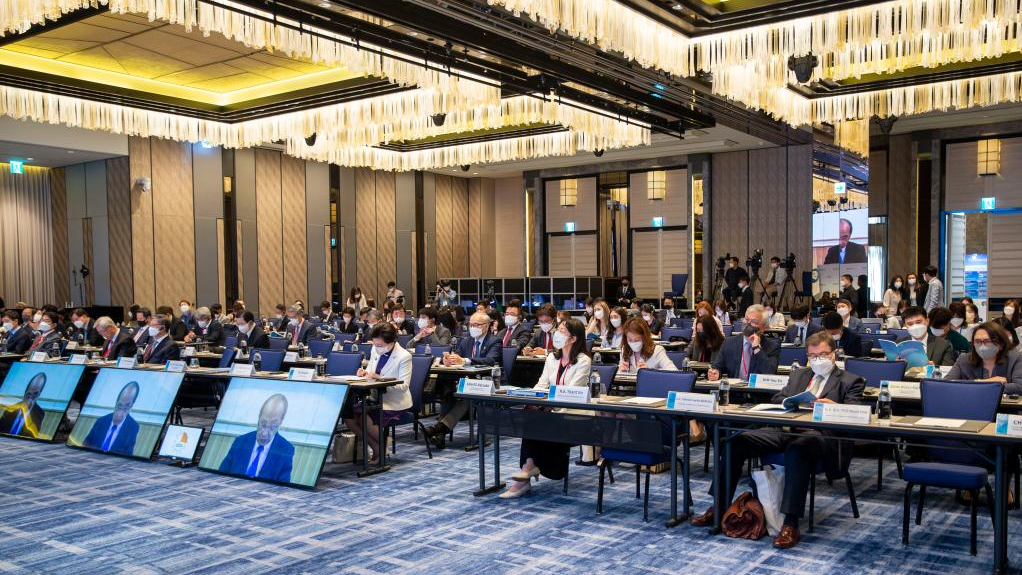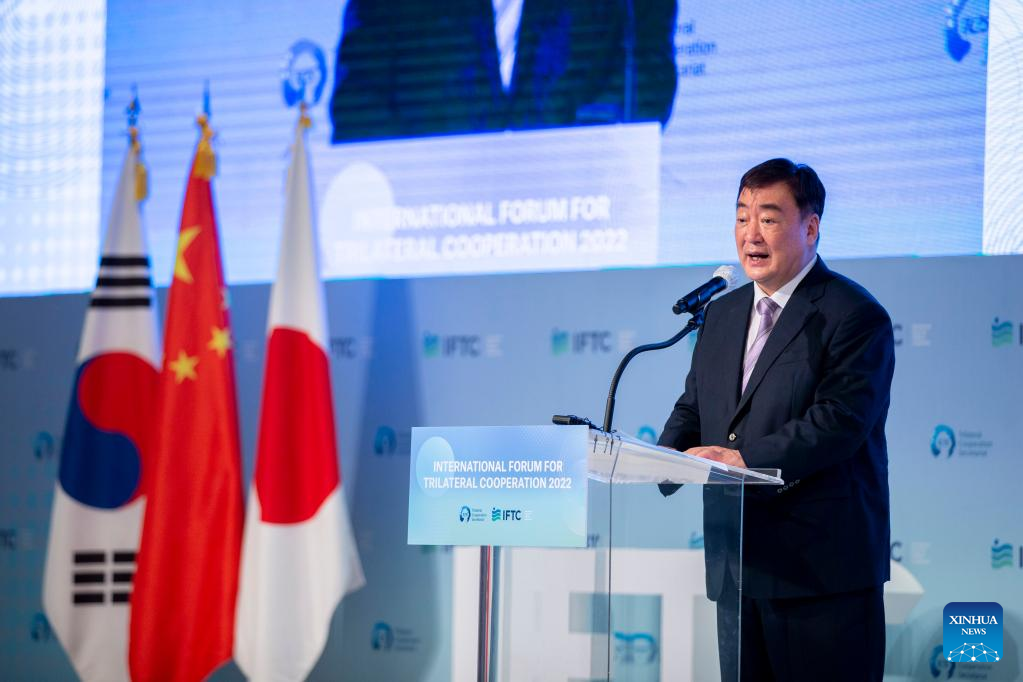
The International Forum for Trilateral Cooperation 2022 among China, Japan and South Korea is held in Seoul, South Korea, June 14, 2022. /Xinhua
The International Forum for Trilateral Cooperation 2022 among China, Japan and South Korea is held in Seoul, South Korea, June 14, 2022. /Xinhua
Editor's note: Hannan Hussain is a foreign affairs commentator and author. He is a Fulbright recipient at the University of Maryland and a former assistant researcher at the Islamabad Policy Research Institute. The article reflects the author's opinions and not necessarily the views of CGTN.
On June 14, the International Forum for Trilateral Cooperation (IFTC) 2022 among China, Japan and South Korea was held in Seoul, under the theme of "Future-Oriented Trilateral Cooperation: Lasting Peace, Common Prosperity, Shared Culture." In his appeal to trilateral engagement, South Korean Foreign Minister Park Jin said the three countries’ capacity and stature in the region, as his Chinese and Japanese counterparts supported efforts that cultivate a deeper understanding among nations. "Given the stature and economic and cultural potential of the three countries, should we continue our future-oriented cooperation, it would be an important driving force for peace and prosperity in the world beyond the East Asia level."
A focus on the countries' combined economic and cultural might is promising because the past two decades have seen Beijing, Tokyo and Seoul backing multiple frameworks and cooperative arrangements to advance peace and development in East Asia. That includes engagement through the Association of Southeast Asian Nations Plus Three (ASEAN+3) to evolve crisis relief capabilities, bolstering an intra-regional trade volume of $2.3 trillion to benefit trade integration, and endorsement of the Regional Comprehensive Economic Partnership.
It stands in the interests of all three partners to strengthen coordination at the Trilateral Cooperation Secretariat and step-up mutual political trust as global challenges – from food to energy – multiply. They must capitalize on a combined $21.4 trillion-strong GDP to address supply chain woes in their immediate neighborhood and soften the blow to a pandemic-hit regional economy.
The trilateral cooperative framework – established several decades ago – has given strength to eight rounds of group summits, and illuminated "wide common interests" on a range of issues. That includes undergirding a rules-based multilateral trading system to explore pathways that help shrink regional development gaps, as Tokyo, Beijing and Seoul remain commited to achieving their "overall revitalization and common development" and extending benefits outwards.
Investing in that pursuit at a time when the trade order is changing, and conflict resolution faces "retrogression," demands that neighboring partners join hands on international cooperation and give their sense of future solidarity concrete shape.

Chinese Ambassador to South Korea Xing Haiming addresses the opening ceremony of the International Forum for Trilateral Cooperation 2022 among China, Japan and South Korea, in Seoul, South Korea, June 14, 2022. /Xinhua
Chinese Ambassador to South Korea Xing Haiming addresses the opening ceremony of the International Forum for Trilateral Cooperation 2022 among China, Japan and South Korea, in Seoul, South Korea, June 14, 2022. /Xinhua
China's top diplomat in South Korea Xing Haiming is correct to warn about the ominous "de-globalization" trend and its emergence during a period of global economic strain. None of the three partners stand to benefit when de-globalization determinants such as protectionism, trade barriers and populism gain some degree of traction in the world economy, identifying at odds with the goal to ensure "lasting peace, common prosperity and shared culture" in the region.
One point of convergence is to restore the healthy frequency of people-to-people exchanges as seen during the pre-pandemic period. China continues to demonstrate its vocal support for such interactions and attaches importance to their role in a deepening understanding of nations. Accordingly, such efforts were met with a consensus at Tuesday's forum and a step in the direction of advancing mutual trust.
Among the many strengths of the Trilateral Cooperation framework is that countries encourage each other to stand more equipped against future uncertainties. For instance, Tuesday's forum gave way to high-level deliberation on how to institutionalize the platform in a way that it addresses non-traditional security challenges emerging in the post-COVID-19 era. The fact that substantial council was derived from academia, diplomats as well as organizational representatives from across the three countries confirms the forum's status as a melting pot for strategic and multistakeholder consensus.
As such, China, Japan and South Korea's past support for institutionalized cooperation in economy, culture, youth and disaster management fields serves as a potent reminder of what these neighboring powers can accomplish together in the face of multiple, simultaneous challenges.
(If you want to contribute and have specific expertise, please contact us at opinions@cgtn.com. Follow @thouse_opinions on Twitter to discover the latest commentaries in the CGTN Opinion Section.)

